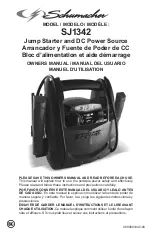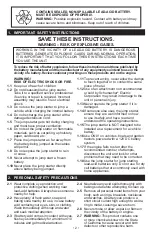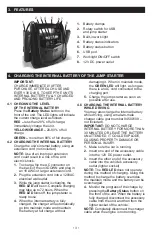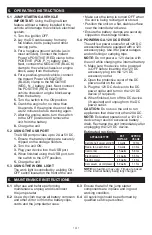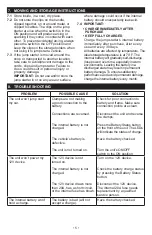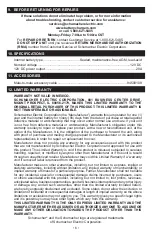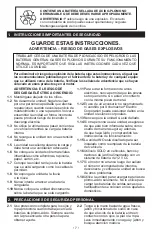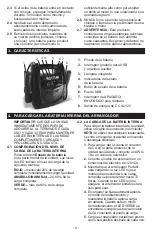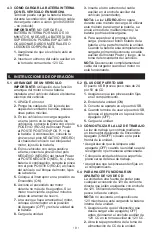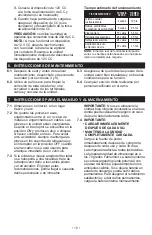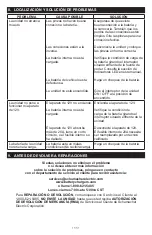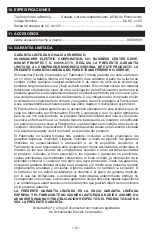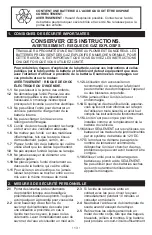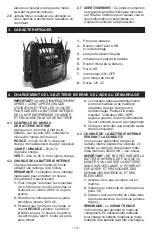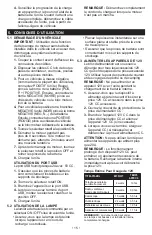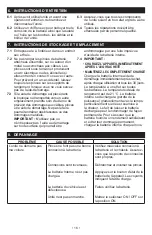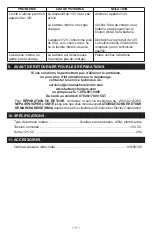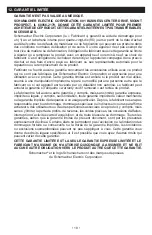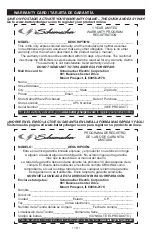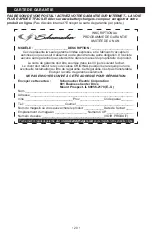
• 5 •
7. MOVING AND STORAGE INSTRUCTIONS
7.1
Store inside, in a cool, dry place.
7.2
Do not store the clips on the handle,
clipped together, on or around metal, or
clipped to cables. The clips on the jump
starter are live when the switch is in the
ON position and will produce arcing or
sparking if they come in contact with each
other. To prevent accidental arcing, always
place the switch in the OFF position and
keep the clips on the storage holders when
not using it to jump start a vehicle.
7.3
If the jump starter is moved around the
shop or transported to another location,
take care to avoid/prevent damage to the
cords, clips and jump starter. Failure to
do so could result in personal injury or
property damage.
IMPORTANT:
Do not use and/or store the
jump starter in or on any area or surface
where damage could occur if the internal
battery should unexpectedly leak acid.
7.4 IMPORTANT:
• CHARGE IMMEDIATELY AFTER
PURCHASE
• KEEP FULLY CHARGED
Charge the jump starter’s internal battery
immediately after purchase, after every
use and every 30 days.
All batteries are affected by temperature. The
ideal storage temperature is at 70
°
F. The
internal battery will gradually self-discharge
(lose power) over time, especially in warm
environments. Leaving the battery in a
discharged state may result in permanent
battery damage. To ensure satisfactory
performance and avoid permanent damage,
charge the internal battery every month.
8. TROUBLESHOOTING
PROBLEM
POSSIBLE CAUSE
SOLUTION
The unit won’t jump start
my car.
Clamps are not making
a good connection to the
battery.
Connections are reversed.
The internal battery is not
charged.
The vehicle’s battery is
defective.
The unit is not turned on.
Check for poor connection to
battery and frame. Make sure
connection points are clean.
Disconnect the unit and reverse
the clamps.
Press the Battery Status button
on the front of the unit. The LEDs
will indicate the status of charge.
Have the battery checked.
Turn the unit’s ON/OFF
switch to the ON position.
The unit won’t power my
12V device.
The 12V device is not
turned on.
The internal battery is not
charged.
The 12V device draws more
than 20A, has a short circuit,
or the internal fuse has blown.
Turn on the 12V device.
Check the battery charge status
by pressing the Battery Status
button.
Disconnect the 12V device.
The internal 20A fuse needs
replacement by a qualified
service person.
The internal battery won’t
hold a charge.
The battery is bad (will not
accept a charge).
Have the battery checked.

